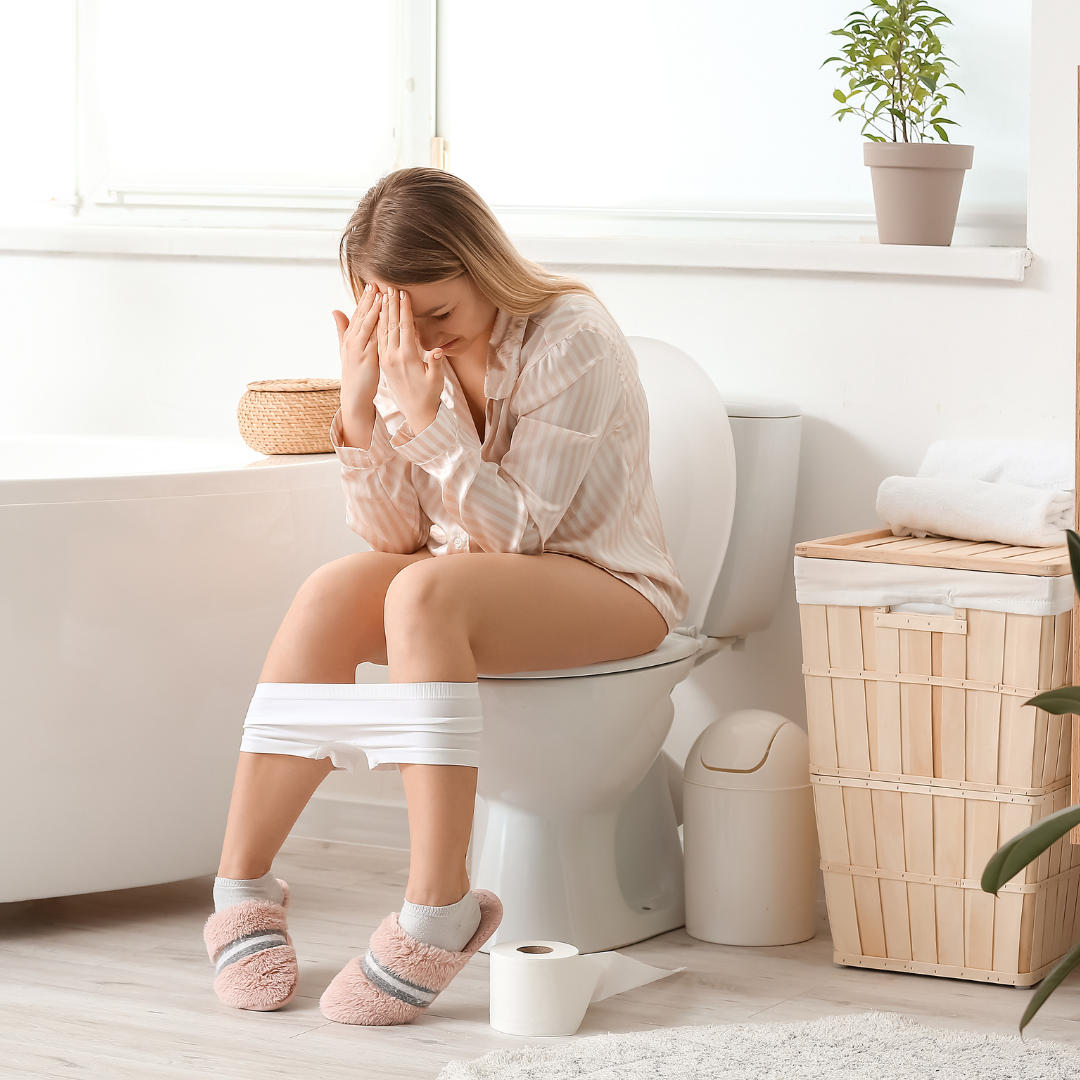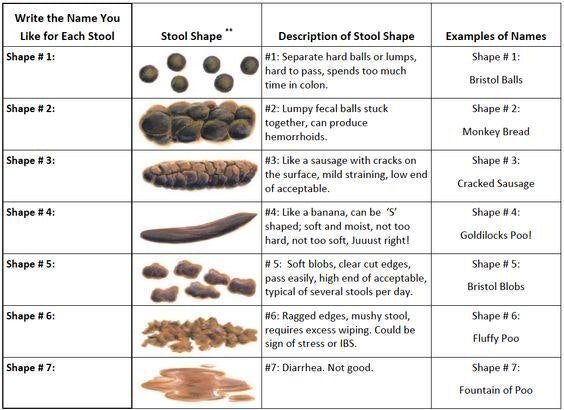Why am I constipated? ...and how to get things moving asap!
Can you think of a time when you went on a vacation somewhere in a different time zone and everything was going great until you realized you hadn’t pooped in 3 days!?
Most people have experienced that uncomfortable, heavy and just plain gross feeling at some point in their life when they weren’t able to go #2.
But did you know that up to 25% of the population suffer from constipation and it effects women twice as often as men¹. It’s definitely not fun to deal with and is something that needs to be taken seriously if it’s happening regularly.
The crazy thing is many people are constipated and have no idea! Let’s take a look at what actually defines constipation so we’re on the same page…
What Constipation Looks Like
Now I know you’re probably thinking constipation means you’re not having regular bowel movements!..no need for a definition.
But constipation is more than just not having a bowel movement regularly. You can have 1 bowel movement a day and still be constipated depending on what you see in the toilet bowl.
Constipation is a decrease in normal bowel freequency but it can also look like:
· Straining during bowel movements
· Feeling like you havn’t fully emptied after a bowel movement
· Lumpy or hard stools
· Feels like there’s an obstruction while evacuating
Bristol Stool Chart: how to measure the quality of your bowel movements
You could have a bowel movement a day but if you’re really straining and when you look in the toilet bowl you see pebbles, this can be a sign that you’re constipated. Constipation can also be accompanied by other symptoms like:
· Bloating
· Nausea
· Loss of appetite
· Abdominal pain
· Headache
· Lower back pain
· Rectal discomfort
Conventional definitions for constipation will also define it as fewer than 3 bowel movements a week, but functional/holistic medicine defines it as less than 1 bowel movement a day.
The ideal bowel movements per day is 2-3 based on optimal transit time of 18-24 hours. However, in North America with our low fiber, highly processed diet transit times can look a lot longer.
At Home Bowel Transit Test
You can do a fun little at home test to determine how long it takes you to digest your food:
Get 1 tablespoon of sesame seeds (or any white seed) and a cup of water
Mix the seeds into the water and drink
Note down the time you drank the seeds at
Every time you have a bowel movement, check to see if you see the seeds. Write down the time you first see the seeds in your stool and calculate the time it took to move through you.
Optimal transit time is 18-24 hours. If it’s less than that, food is moving too quickly through your intestinal tract. If it’s longer, food is moving too slowly through your intestinal tract.
I like to use the acronym FIFO- Food In, Food Out. When you eat food, it stimulates a nerve impulse in the intestinal tract to move food along in the colon. If you’re having less than 1 bowel movement a day, especially accompanied by some of the other criteria I noted above, you’re going to want to pay attention here!
Why Constipation Should be Taken Seriously
Think about what happens to a port-a-potty when it hasn’t been emptied out. It gets really stinky and waste builds up to a point where the bacteria levels become dangerous.
Why constipation should be taken seriously: bacteria build up
Why Constipation Happens
There are many underlaying causes of constipation. Some are more dietary in nature and some are more physiological issues. You may have just one or a combination of some of the following:
Dietary Causes of Constipation:
Low fiber diet: most of our modern Western diet of highly processed foods are low in fiber. Fiber is one of the key ingredients your intestines need to increase freequency and quantity of bowel movements.
Dehydration: Most people do not drink enough water! I like to use a boat on a stream as an analogy here. A boat cannot cruise down the river if the river is dry. It becomes very difficult for your stool to form and pass if there’s little water available to keep things flowng. It’s important to note if you consume high amounts of diuretic drinks like coffee, tea, soda and sugar filled beverages, they are even more dehydrating!
Mineral deficiency: Potassium, sodium and magnesium are electrolytes, needed for muscle contraction and regulation of water balance needed for bowel motility. Magnesium is also required for relaxation of the intestinal muscles as well as the wave like movement through the intestines to push stool through the colon.
Physiological Causes of Constipation:
Hypothyroidism: a side effect of low thyroid function is decreased motility of the intestinal tract. If you have constipation along side fatigue, unexplained weight gain, impaired memory and hair loss it may be worth getting tested.
Diabetes Mellitus: diabetes can increase risk of developing constipation due to it’s impact on the autonomic nervous system which controls involuntary movements in the body.
Hypercalcemia: this is increased calcium in the blood which leads to improper muscle contraction and relaxation. Calcium and magnesium oppose each other and having too much calcium in the body can lead to a state of magnesium deficiency. As mentioned above, magnesium deficiency cause of constipation.
Medication/Drugs: some drugs have side effects including constipation. Mediations that can cause constipation include pain medication, antacids, anti-convulsant, anti-histamines, anti-depressants, analgesics (Tylenol, Aspirin, NSAIDs)
Low serotonin levels: serotonin helps facilitate communication between the nervous system in the stomach and the central nervous system. It helps promote gut function and if low, may impact motility.
IBS/SIBO: Bacterial overgrowth, especially archaea dominant (Intestinal Methanogen Overgrowth), can result in constipation. Theses microbes produce methane gas which slows motility. Over time the gas levels increase, significantly impacting the person’s ability to have regular bowel movements.
Natural Remedies to Relive Constipation
If you struggle with constipation, there are many things you can do at home to help improve your bowel movements. Here are some things you can do right now to help with constipation:
Eat high fiber foods: High fiber foods including bran, oats, flaxseeds, psyllium husk, prunes, kiwi’s and figs and have the ability to hold extra water in the stool, increasing stool volume. A good stool volume helps to stimulates motility of the intestines and push the stool through the colon.
This may be one to hold off on if you’re struggling with SIBO. You want to make sure you’re drinking enough water if you’re going to supplement with a fiber powder as well!
2 kiwi a day for effective treatment of constipation²
Drink lots of water: Drink lots and lots of filtered water! Aim for 10-12 cups a day and add 2 more per caffeinated or sugary beverage. If you’re working out you’ll need a couple more as well!
Eat a diet high in minerals: focus on adding a pinch of good quality salt (Celtic or The Real Salt) to your water in the mornings as well as foods high in potassium and magnesium.
Foods high in magnesium include leafy green vegetables, whole grains, beans and nuts.
Foods high in potassium include coconut, winter squash, sweet potato, avocado and banana. If you have SIBO it may be best to take trace minerals as some of these foods are hard to digest.
Avoid allergenic foods including soy & dairy: eating foods your sensitive to can result in various digestive symptoms including constipation. Try removing allergenic foods (soy, dairy, gluten, corn, eggs, nightshade vegetables) and see if your constipation improves.
Supplemental minerals: food is always the best place to start but sometimes supplementation is necessary to get things moving. Magnesium is non habit forming and does not irritate the intestinal tract. Magnesium citrate is an ideal form for constipation as it helps draw water to the intestines.
Get enough probiotics: probiotics help improve gut health including gut transit time and stool consistency. Probiotic foods include kimchi, sauerkraut, beet kvass, miso, fermented pickles or the cheapest way is to ferment them at home yourself!
If you can’t tolerate probiotics or dislike the taste, probiotic supplements can be taken as well. I suggest asking a holistic practitioner or health food store staff about the best probiotic for you. If you have SIBO you want to wait to take probiotics until after the bacteria have been eliminated.
Herbal supplements: certain herbs have a more laxative effect on the body. Senna, cascara sagrada, Turkish rhubarb and triphala are all options, however certain ones can be habit forming and is best recommended under supervision of a trained herbal practitioner.
Circular massage: stomach massage can help to relax the muscles of the large intestine, promoting movement of the wave like contraction to encourage a bowel movement.
How to: Lay down and take a few deep breaths. Start by massaging the end of your colon towards the bottom of the left hip. Make small circular motions with your hands. Move along the intestine up towards the bottom of your rib cage, across your belly and down the right side of your hip. Using a flat hand, flush clockwise back towards the end of your colon. Repeat as many times as you’d like.
If you’ve tried all of the above and still consistently struggling to have daily bowel movements, it might be time to seek out some help! This is especially true if you’re suffering from a bacterial overgrowth, since many of the standard remedies above aren’t suggested while bacteria is present.
If you need some help determining if your bowel movement freequency is something you should be worried about and take action on I’d be happy to discuss this with you! I offer 20 minute discovery calls free of charge to assess the type of support you’ll need.
You can access book your free discovery call right away by clicking here.




